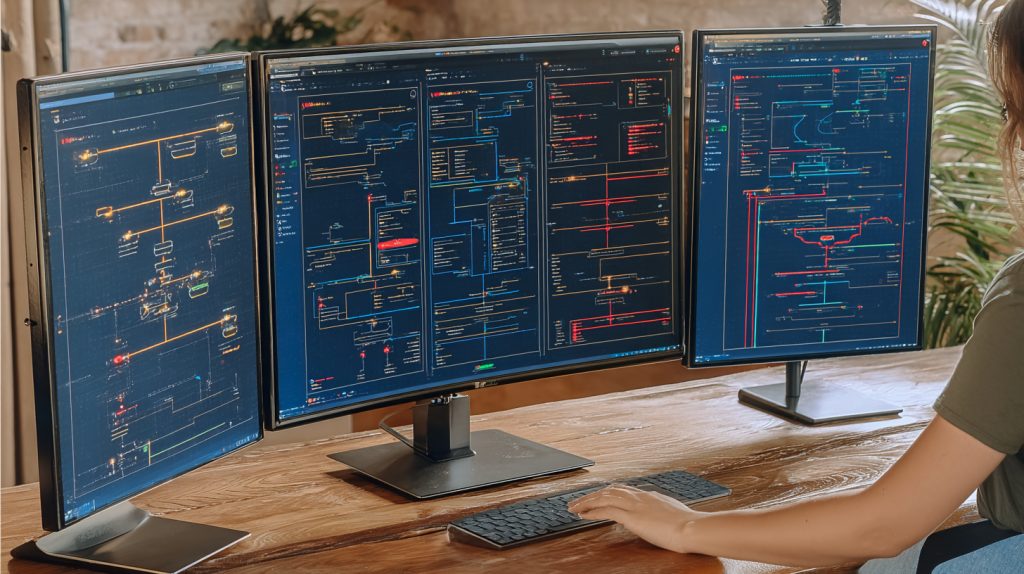
Table of Contents
When a startup barely 18 months old raises $2 billion and sees its valuation skyrocket from $545 million to $8 billion in seven months, you’re witnessing either spectacular hubris or a genuine inflection point in how artificial intelligence gets built. In Reflection AI’s case, it might be both.
The Brooklyn-based company announced its massive funding round in early October, led by chipmaker Nvidia and backed by an all-star roster that reads like a who’s-who of tech power brokers. The funding round saw participation from prominent investors, including former Google CEO Eric Schmidt, Citi and Donald Trump Jr.-backed private equity firm 1789 Capital, as well as existing investors Lightspeed and Sequoia, according to Reuters. It’s the kind of capital infusion that typically signals either revolutionary technology or investor FOMO run amok.
Founded by two Google DeepMind veterans, Misha Laskin (who led reward modeling for Gemini) and Ioannis Antonoglou (co-creator of AlphaGo, the AI that humbled the world’s Go champion in 2016), Reflection AI is betting everything on a single provocative thesis: the future of superintelligent AI shouldn’t be locked inside a handful of corporate fortresses.
America’s Answer to China’s DeepSeek
The company, which originally focused on autonomous coding agents, is now positioning itself as both an open source alternative to closed frontier labs like OpenAI and Anthropic, and a Western equivalent to Chinese AI firms like DeepSeek.
This pivot matters more than it might seem. While American AI discourse obsesses over Sam Altman’s latest prediction about artificial general intelligence, China’s DeepSeek has been quietly waging a price war, pushing out ultra-efficient models that rival GPT-4 Turbo’s performance at a fraction of the cost. Europe’s Mistral AI has carved out defensible territory in banking and defense, raising over $1 billion and hitting a $6 billion valuation by focusing on data-sensitive industries.
Reflection wants to compete on all fronts at once: efficiency, precision, and global reach. It’s an audacious strategy that requires not just brilliant engineering but also the kind of compute infrastructure that only deep-pocketed backers can provide. That’s where Nvidia’s dominant position in AI chips becomes crucial to understanding this deal.
The company’s CEO frames the mission in explicitly geopolitical terms. Reflection AI co-founder and CEO Misha Laskin frames their mission as a “modern day Sputnik moment,” driven by the urgency to offer an American-led, open-source alternative to compete with rapidly emerging models from China. When a tech founder invokes Sputnik, you know they’re either pitching venture capitalists or testifying before Congress. Probably both.
Building Tools That Build Themselves
What exactly is Reflection building? The company describes its focus as “superintelligent autonomous systems,” which in practical terms means AI that can write, debug, optimize, and evolve entire codebases with minimal human oversight. Unlike GitHub Copilot or other coding assistants that suggest snippets, Reflection’s flagship product Asimov (launched in July) manages entire software lifecycles.
Trained on vast datasets that include a company’s codebase and operational data, Asimov learns not only how software works but also why it exists. The distinction matters: understanding intent allows the system to make architectural decisions, not just syntax corrections.
Reflection AI views autonomous coding as a “root node” in that by mastering software itself, users can bootstrap higher forms of automation and intelligence. In other words, if AI can build better AI, you’ve created a self-improvement loop. It’s the kind of exponential capability curve that either revolutionizes technology or implodes spectacularly when reality fails to match the pitch deck.
The company claims it has assembled a team of about 60 researchers poached from DeepMind, OpenAI, and other frontier labs. Over the last year, Reflection AI assembled a team who have pioneered breakthroughs and developed a large-scale LLM and reinforcement learning platform capable of training massive Mixture-of-Experts (MoEs) models at frontier scale.
The Open Source Gamble
Here’s where Reflection’s strategy gets interesting and potentially problematic. The company promises “frontier open intelligence” that anyone can access, audit, and build upon. It’s a direct challenge to the walled gardens of OpenAI, Google, and Anthropic, which keep their most powerful models proprietary and often refuse to explain how they work.
But “open” in AI has become a slippery term. Reflection AI’s definition of being “open” seems to center on access rather than development, similar to strategies from Meta with Llama or Mistral. In practice, this often means releasing model weights while keeping training data, architecture decisions, and fine-tuning methods opaque. It’s open in the same way a locked filing cabinet with the key taped to the front is “accessible.”
The transparency argument runs headlong into another problem: security. Cisco researchers recently revealed vulnerabilities in DeepSeek’s R1 that could be exploited through algorithmic jailbreaking. If China’s supposedly robust open model can be hacked, what happens when Reflection releases frontier-scale systems that bad actors can probe, reverse-engineer, and weaponize?
Reflection’s answer is that safety through obscurity doesn’t work anyway. “We believe the answer to AI safety is not ‘security through obscurity’ but rigorous science conducted in the open, where the global research community can contribute to solutions rather than a handful of companies making decisions behind closed doors.”
It’s a compelling philosophical stance. Whether it survives contact with state-sponsored hacking attempts, misinformation campaigns, or simple regulatory pressure remains to be seen.
The Nvidia Angle and Infrastructure Politics
Nvidia’s leadership role in this round isn’t just about money. The chip giant reportedly contributed between $250 million and $500 million directly, but the real value lies in compute access and strategic alignment. Building frontier models requires staggering amounts of GPU power, the kind that only Nvidia currently supplies at scale. By backing Reflection, Nvidia ensures another major customer for its H100 and upcoming Blackwell chips while hedging against a future where OpenAI or Google vertical-integrate their own silicon.
White House AI and Crypto Czar David Sacks publicly cheered the announcement, posting about the importance of American open-source AI. When government officials start picking winners in emerging technology markets, it’s usually because they’ve decided the geopolitical stakes outweigh free-market principles. The AI race increasingly looks less like startup competition and more like a proxy battle for technological supremacy between Washington and Beijing.
What Could Go Wrong

Reflection hasn’t released a single model yet. The company promises its first text-based system (with eventual multimodal capabilities) will drop early next year. Until then, we’re evaluating a $8 billion valuation based on a team’s credentials, a prototype coding assistant, and a very ambitious roadmap.
History offers cautionary tales. Magic Leap raised over $2 billion promising revolutionary augmented reality before shipping a disappointing headset. Theranos convinced powerful investors of its blood-testing breakthrough until the whole thing collapsed as fraud. Quibi burned through $1.75 billion in six months trying to reinvent mobile video.
The AI boom creates its own distortions. Over half of all venture capital in early 2025 going into AI startups. When that much money chases a single sector, valuations detach from fundamentals. Investors start betting on narratives rather than products, on potential rather than performance.
Reflection also faces genuine technical challenges. Building models that match GPT-4 or Claude 3 requires not just compute but also data quality, architectural innovations, and countless engineering decisions that separate functional systems from vaporware. The company’s claim about training “tens of trillions of tokens” sounds impressive until you realize OpenAI, Google, and Anthropic have been doing similar-scale training for years with mixed results.
The Verdict on Openness
Despite the hype, Reflection’s success could reshape AI development in meaningful ways. If the company delivers on its promise of transparent, auditable frontier models, it creates a genuine alternative to corporate black boxes. That matters for democratic accountability, scientific progress, and competitive markets.
The open-source strategy also allows smaller companies, researchers in developing nations, and independent developers to build on cutting-edge technology without negotiating licensing deals or paying per-token fees. It’s the difference between a few labs controlling superintelligence and intelligence becoming genuine infrastructure, like electricity or the internet.
But openness only matters if the models actually work. Reflection has until early 2026 to prove it can turn DeepMind pedigree, Nvidia chips, and $2 billion in funding into something that rivals ChatGPT. The company is betting that elite talent plus open collaboration beats proprietary secrecy. We’re about to find out if that thesis survives contact with the brutal economics of frontier AI development.
In the meantime, Laskin and Antonoglou have assembled one of the best-funded bets in modern tech history. Whether it becomes a breakthrough or a cautionary tale depends on execution, not just capital. And in AI, execution means shipping models that work, not just manifestos about openness.
The Sputnik moment rhetoric sounds stirring. But the original Sputnik launched successfully. Reflection still needs to prove it can get off the ground.